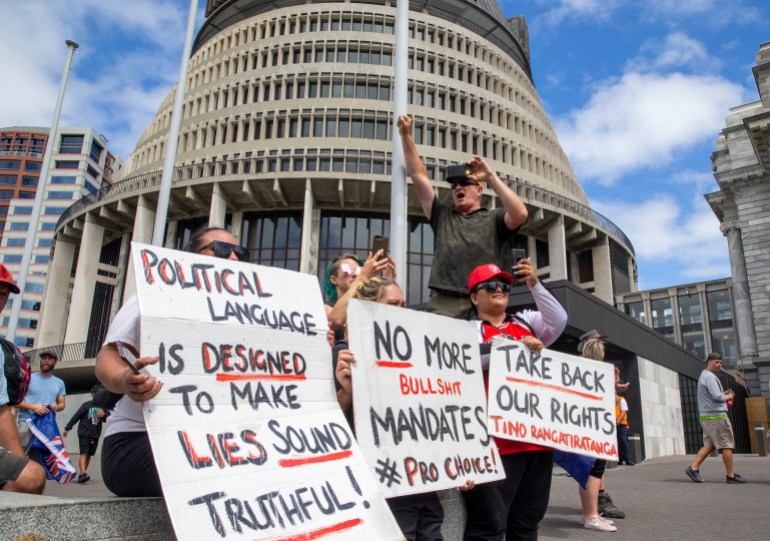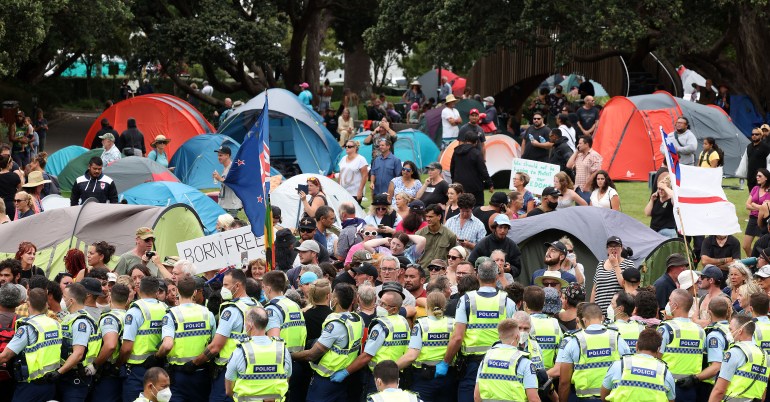‘Move on’: New Zealand police break up Wellington trucker protest
Some 120 people arrested as officers move against protesters who converged on Wellington on Tuesday.

Scuffles broke out and some 120 people were arrested in New Zealand on Thursday as police began forcefully removing a protest against COVID-19 vaccine mandates and other pandemic measures outside the parliament building in Wellington.
Inspired by the trucker demonstrations in Canada, protesters began blocking streets in the capital with trucks, cars and motorbikes on Tuesday, pitching their tents outside parliament.
Keep reading
list of 4 itemsArdern moves to relax New Zealand’s tough border controls
As Omicron pushes the West to reopen, Asia hunkers down
New Zealand PM Ardern postpones wedding amid Omicron curbs
The police moved in after parliament speaker Trevor Mallard took the rare step of closing the grounds around the distinctive “Beehive” parliament building.
Some 100 officers were called in from elsewhere in the country as reinforcements.
A heavy line of police gradually moved into the crowd amid cries of “This is not democracy” and “Drop the mandate”. As successive protesters were handcuffed and taken away, others shouted “Shame on you!” at the police with reports that had two officers had been assaulted in the melee.
“In terms of the 120 arrested today the charges are trespass or obstruction,” Wellington District Commander Superintendent Corrie Parnell told the media. The New Zealand Herald said none had been charged with assault .

Prime Minister Jacinda Ardern on Thursday told the crowd to “move on”, saying the demonstration was “not reflective of where the rest of New Zealand is at right now.”
“All of us want to actually move on. We are working very hard to put ourselves in the best possible position to do that,” Ardern told reporters after visiting a COVID-19 vaccination centre in Auckland.
The protest began with more than 1,000 people from around the country converging on parliament.
The number of protesters had dwindled by Thursday, but some of their vehicles remained parked in the middle of streets around parliament, forcing some streets to be closed. The National Library and many cafes and bars in the area decided to close their doors while the protest played out.
Among the protesters’ grievances is mandatory COVID-19 vaccination for certain workers, including teachers, doctors, nurses, police and military personnel, and rules requiring masks in places such as shops and forcing children to wear masks in schools.
Border closures and sometimes strict lockdowns have helped New Zealand escape the worst of the pandemic. The country has reported just 53 virus deaths among its population of 5 million.
Ardern last week announced plans to relax quarantine requirements for incoming travellers in stages as the country reopens its borders. With a large proportion of people now vaccinated, she has also promised not to impose more lockdowns.

Health officials have been reporting about 200 new virus cases each day as an outbreak of the Omicron variant grows.
Ardern said every New Zealander had the right to protest but that should not disrupt other people’s lives, adding the decision to remove protesters was an operational matter for police.
Police moved back later in the afternoon, but were expected to remain overnight according to the New Zealand Herald.
Parnell told the paper the operation was likely to continue for some days.